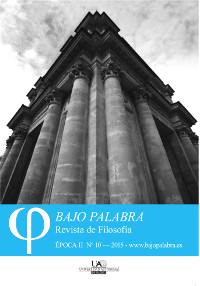Negativity and Event: A Dialogue between Adorno and Heidegger from the Perspective of Gianni Vattimo's Hermeneutics
Keywords:
Adorno, Heidegger, hermeneutics, Marx, mysticism, Vattimo, Adorno, Heidegger, hermeneutics, Marx, mysticism, VattimoCopyright (c) 2015 Daniel Mariano Leiro

This work is licensed under a Creative Commons Attribution 4.0 International License.
Abstract
This paper attempts to sketch a more radical interpretation of Heideggerian ontology that went unnoticed by Adorno’s destructive criticism. In doing so we try to restore the emancipatory aspirations to the dissolution of all domination that encouraged the author of Negative Dialectik. Those efforts went unrealized in Adorno's thought because his critique became lost in the horizon of metaphysics. To show this we have chosen as an interpretive conduit Gianni Vattimo’s reading developed in his last nihilistic hermeneutics. This reading joins the most recent attempts to develop a “left-wing Heideggerianism,” but its achievement is reengaging in a dialogue with Nietzsche and the Hegelian-Marxist tradition, in order to reveal the transforming and differentiating potential that still now courses through Heidegger’s philosophy.
Downloads
References
ADORNO T.W., La actualidad de la filosofía, Trad. José Luis Arantegui Tamayo, Paidós, Barcelona, 1991.
ADORNO T.W., “Para qué aún filosofía” en Crítica de la cultura y sociedad II, Obra completa. 10-2, Trad. Jorge Navarro Pérez, Madrid, Akal, 2009.
BENJAMIN, W., “Sobre el concepto de historia” en Estética y Política, Trad. Julián Fava, Buenos Aires, Las cuarenta, 2009.
BUCK-MORRS, S., Origen de la dialéctica negativa, Siglo XXI, México, 1981
FRIEDMAN, G., “Heidegger”, en La filosofía política de la escuela de Frankfurt, FCE, México, 1986: pp.74-81.
GIORGIO, G., “Il confronto con Adorno” en Il Pensiero di Gianni Vattimo.L´emancipazione dalla metafísica tra dialettica ed ermeneutica, FrancoAngeli, Milan, 2006: pp. 150-180.
GOLDMAN, L., Lukács y Heidegger. Hacia una nueva filosofía, Amorrortu, Buenos Aires, 1974.
JANICAUD, D., Heidegger en France, Paris, A. Michel, 2001.
KOSTAS, A., Marx y Heidegger. Introducción a un pensar futuro, Amorrortu, Buenos Aires, 1981.
MARCHART, Oliver, El pensamiento político posfundacional, FCE, México, 2009
NIETZSCHE, F., “Cómo el ‘mundo verdadero’ acabó convirtiéndose en una fábula” en El Crepúsculo de los ídolos, Trad. A. Sánchez Pascual, Alianza, Madrid, 1979: pp. 51-52
TAFALLA, M., Theodor W. Adorno. Una filosofía de la memoria, Herder, Barcelona, 2003.
SILESIUS, A., El peregrino querúbico, Ediciones Siruela, Madrid 2005.
SÜTZL, W., Emancipación y Violencia. El pacifismo estético de Gianni Vattimo, Icaria, Barcelona.
VATTIMO, G., “Heidegger y la Verwindung de la modernidad” en Más allá del pensamiento débil. Filosofía, Política y Religión, Alvarez (ed.), Ediciones Novel, Oviedo,
: pp. 92-105.
VATTIMO, G., “Metafísica y Violencia” en Debilitando la filosofía. Ensayos en honor a Gianni Vattimo, Anthropos-Universidad Autónoma Metropolitana, Barcelona, 2009: pp. 451-475.
VATTIMO, G., Ecce Comu, Paidós, Buenos Aires, 2009.
VATTIMO, G., Adiós a la verdad, Gedisa, Barcelona, 2010.
WELMER, A., Sobre la dialéctica de la modernidad y posmodernidad. La crítica de la razón después de Adorno, Visor, Madrid, 1993.
